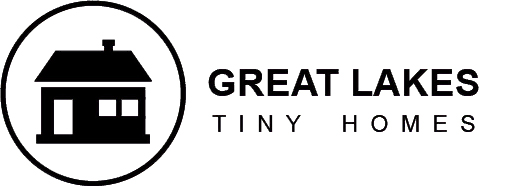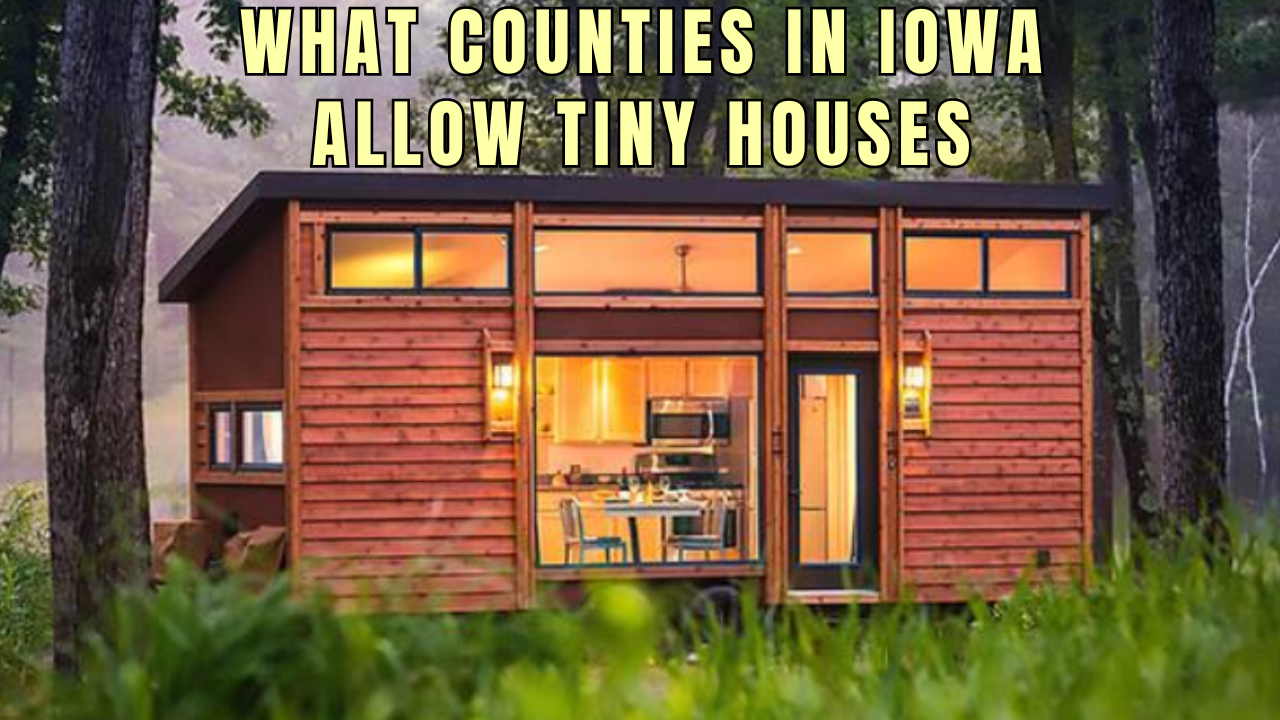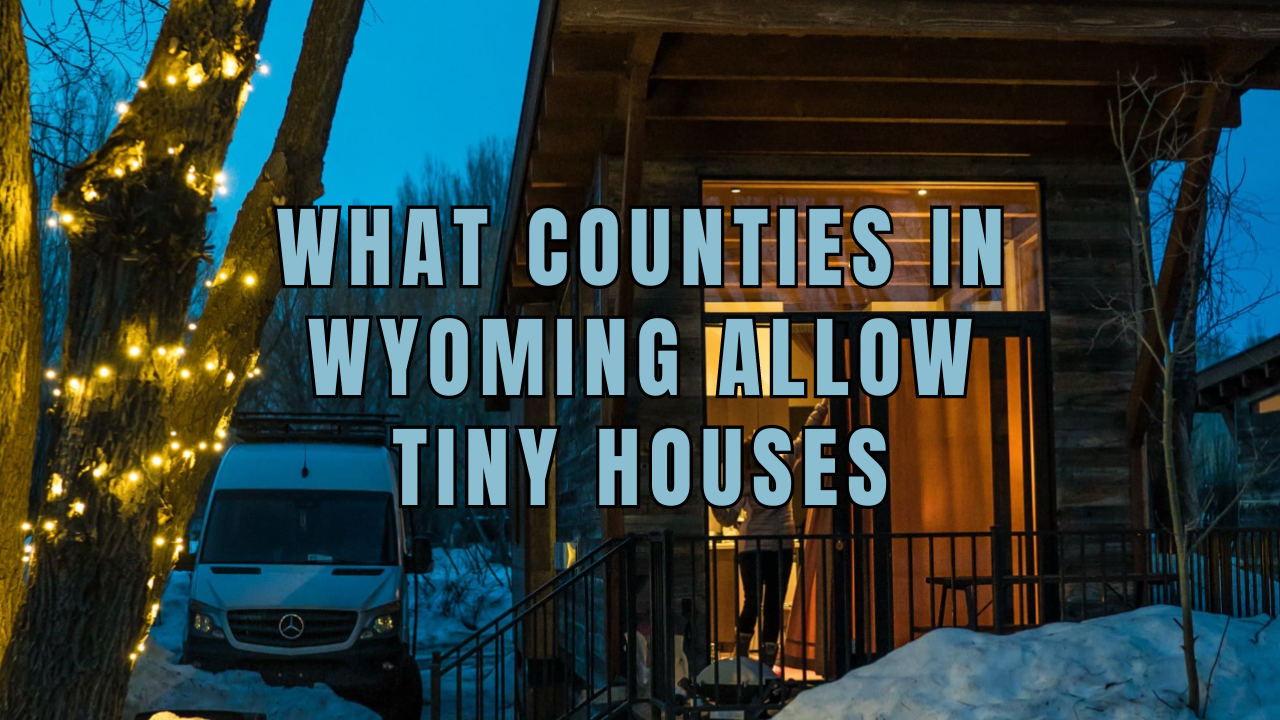The tiny house movement has been gaining popularity, with many people opting for smaller, more affordable living spaces. However, not all counties are on board with this trend. Some counties prohibit the construction or placement of tiny houses, while others have specific rules and regulations. If you’re looking to build or buy a tiny house in Iowa, it’s crucial to be aware of these restrictions.
In this article, we’ll explore which counties in Iowa allow tiny houses and the rules and regulations to consider before investing in one. Whether you’re searching for tiny house real estate in Iowa or looking to build your own house, this information will be essential.
Tiny House Prices in Iowa
Since most tiny homes are personalized, factors influencing their cost include location, size, design, materials, and finishing; additional expenses include permits from the appropriate county or city.
Between $200 and $350 is the average cost per square foot in Iowa. Likewise, the price to build a house can vary greatly; simple cabin kits might run you between $6,000 and $8,000, while personalized tiny homes can cost over $100,000. However, check out the tiny houses for sale in IA.
What Counties in Iowa Allow Tiny Houses?
Iowa has a complicated tiny house policy, with several laws and ordinances that vary by county, city, and even region. The integration of tiny homes into the housing landscape is further complicated because the average house size in Iowa is far from what is commonly considered a tiny house.
There are additional obstacles to overcome for individuals interested in living off the grid in a tiny house, such as Iowa’s stringent sewage removal rules and the prohibition on compost toilet usage.
Harrison County
Harrison County has specific zoning regulations that impact the construction and placement of tiny homes. These regulations ensure the safety and well-being of residents, and they often dictate where tiny houses are, how to construct them, and what size restrictions apply for tiny housing on a foundation that is 400 square feet. For example, in some areas, tiny houses may only be allowed in designated zones, such as RV parks or communities.
Additionally, there may be minimum square footage requirements and restrictions for tiny homes on utilities and waste disposal. For anyone interested in living in a tiny house in Harrison County, thoroughly research and understand the local zoning regulations before making any decisions.
Clinton County
In Clinton County, Iowa, local zoning regulations regulate tiny house laws. The county has specific guidelines for the placement and construction of tiny houses, including minimum square footage requirements and rules for parking and setbacks.
Furthermore, zoning regulations may dictate whether a tiny house can be classified as a permanent dwelling or must be considered a temporary or accessory structure. Prospective tiny home builders need to understand and adhere to these local laws.
Tiny House Regulations And Rules In Iowa
In Iowa, regulations for tiny homes can vary by city and county. Some municipalities have specific zoning codes and building regulations for tiny homes, while others may not have established rules. Those looking to build or live in a tiny house in Iowa should research local regulations and obtain the necessary permits before starting a project. Consider sewage, water, and electricity hookups when planning a tiny house in Iowa.
Permanent Structure Rules
The 2021 International Residential Code (IRC), which establishes construction requirements that make it difficult to live in a tiny home on a foundation, has resulted in strict regulations for permanent tiny dwellings in Iowa. Iowa is among the states that have not embraced the small house movement, even though it is permitted in the USA. The state’s zoning and off-grid regulations made it more difficult to find and reside in a small house, which restricts tiny homes in several counties and towns. On the other hand, provided they satisfy local regulations, certain towns and localities could permit small homes on a foundation. A small house will be subject to conventional house taxes if it satisfies these standards.
Among the general guidelines are the following:
- Establishing consistent guidelines and specifications for buildings, supplies, and machinery.
- The standards need to follow Section 103A.7 of the state building code. Green construction standards, commonly known as sustainable design, should also apply to permanent structures.
- Limiting the application of thermal efficiency criteria for energy savings to the construction of heated or cooled buildings.
- The county or city determines the minimum square footage required.
Temporary Structure Rules
In Iowa, temporary small dwellings are considered recreational vehicles (RVs) on wheels. Because of this categorization, they are exempt from many zoning laws when built in backyards, which may be advantageous for those who want to live in a small home without having to deal with as many restrictions as they would with a permanent building. RV tiny houses may provide greater freedom, but it’s crucial to remember that they still have to follow any local laws that may be in force.
As an illustration, consider Cedar County, which has regulations regarding mobile homes and how to use them:
- Before being moved to another county, the mobile home must get a tax clearing certificate from the current county.
- If a tiny home is parked in a park or outside of a county, it will be taxed as a mobile home rather than real property.
- Similar to a regular car, you must transfer titles for the mobile home within 30 days after purchase.
Transitional Structure Rules
In Iowa, transitional housing serves as a bridge between homelessness and permanent housing. While small home programs are not specifically offered by the state, various transitional housing programs are. It suggests that although small homes aren’t employed in this situation right now, there is a supporting housing structure that may be modified to include tiny dwellings.
For instance, the approval of a village of small dwellings for the homeless in Des Moines suggests a shift toward acceptance of tiny homes for transitional uses.
In Iowa Where Can I Build A Tiny House?
The location of your tiny house is vital. Then, choose a certified tiny house constructor to help you with the process, manage all the documentation, and ensure your residence follows the building codes.
Constructing a tiny house is a big plan, but it doesn’t have to be stressful. Here are some typical places for houses:
- Private properties
- Tiny house communities
- RV parks
- National Parks and campgrounds
Tiny House Communities in Iowa
In Iowa, there are no tiny home communities or villages since it is hard to construct tiny buildings due to the laws and ordinances in various counties and cities.
Tiny House Builders Near Me
Great Lakes Tiny Homes provides a variety of tiny house designs with nationwide shipping, removing the need to search for local builders to discover your perfect home.
Great Lakes Tiny Homes is also an RV Industry Association (RVIA) builder. For tiny homes passionate about the highest production standards and rigorous adherence to construction, safety, and regulatory rules.
Do I Need a Certified Builder?
You certainly do. Working with an RVIA-certified builder, such as Great Lakes Tiny Homes, ensures that a tiny home is under the laws and regulations.
Furthermore, it provides tranquility since it is legal in Iowa and assures that the materials in your home are safe, long-lasting, and of high quality.
Working with a qualified builder also provides access to finance and insurance coverage. RVIA certification ensures that your small house is a secure and appropriate environment to live in.
FAQs
Can You Make a Tiny House in Iowa Your Main Residence?
Yes, you can live in a small house full-time in Iowa.
However, consider the local restrictions and regulations. Check with your local authorities and zoning officials to see if your small house complies with standards and regulations, including inspections.
To experience the benefits of simpler, more sustainable living in Iowa, do your task and consult with licensed builders.
Can I Build and Place a Tiny Home in My Iowa Backyard?
When creating a small house and following rules and regulations, the type of tiny house is relevant. Any extra structure in the rear that is not a permanent residence may be referred to as a carriage house.
You won’t have to worry about many zoning laws when putting a tiny house in your backyard because RVs are tiny houses on wheels.
In Iowa, How Tiny Could a Home Be?
When considering creating a tiny home in Iowa, Iowa Falls is the best example. It has a 500-square-foot minimum requirement, giving it the state’s minimum requirement for building a dwelling. Some counties and cities have substantial minimum size restrictions.
The new zoning code excludes dwellings smaller than 1,100 square feet. That implies that small residences aren’t an option in the city of Des Moines.
The typical house size in Iowa is 1,550 square feet, which, once again, is not an optimum size for a tiny house.
Conclusion
In summary, while there are no statewide laws for small houses in Iowa, their legality is established by municipal zoning ordinances and construction codes. Prospective tiny homeowners must research the unique needs of the county or city they desire to live in.
Some counties, such as Harrison County, are known to allow small residences, while others have more stringent size restrictions. Off-grid living is legal in some areas, but there are strict environmental and utility restrictions. The cost of constructing a small house in Iowa varies, and the state’s stance on tiny houses mirrors the issues given by municipal zoning rules.





